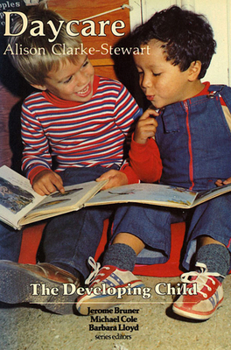Daycare: Revised Edition
Select Format
Select Condition 
Book Overview
There are eight million preschoolers whose mothers now work, most of them because of economic necessity. For these mothers the question is not whether to use daycare, but how to choose among the available options in a way that is best for the child. These are just the questions taken up in Daycare, a brief and readable summary of the best information modern "baby science" has to offer about how daycare affects young children and how to tell the difference between daycare that helps and daycare that hurts.
On the basis of her own research and a complete review of the most recent daycare studies, Alison Clarke-Stewart concludes that good daycare definitely does not impair the child's development either emotionally or intellectually. Fears that daycare children will fail to develop proper parental attachments and will cling instead to their peers are unfounded; so too are fears that mental growth will be slowed. In fact, there is some evidence that social and intellectual development can be facilitated in good daycare environments. The real question is just what these environments are made of, and here Daycare provides a complete discussion of the necessary ingredients, including a checklist that parents can use to make their own evaluation of any daycare arrangement. This is a book that covers all the practical problems daycare parents must face and suggests ways to solve them that are based not on psychological theory or political conviction but on the facts as we now know them.Format:Paperback
Language:English
ISBN:0674194063
ISBN13:9780674194069
Release Date:January 1993
Publisher:Harvard University Press
Length:173 Pages
Weight:0.60 lbs.
Dimensions:0.6" x 5.4" x 8.2"
Related Subjects
Biographical Biographies Biographies & History Biography & History Gender Studies Health, Fitness & Dieting Health, Fitness & Dieting Parenting & Relationships Political Science Politics & Government Politics & Social Sciences Psychology Psychology & Counseling Public Affairs & Policy Public Policy Social Sciences Social Services & WelfareCustomer Reviews
0 rating





